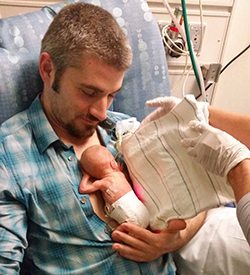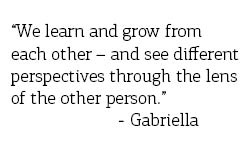A Strong Marriage Takes Intention When Raising a Medically Complex Child

Last month we kicked off our marriage series with a discussion of the impact that raising a medically complex child has on a marriage. After talking with a number of parents, we got a better understanding of the adjustments they’ve had to make, ways they rely on one another for support, and how they manage financial concerns associated with medical costs. These conversations lead to valuable insights and takeaways for readers navigating similar waters, and we want to keep this sharing opportunity going with our second installment. This time, the couples we spoke with talk about how and why they maintain a strong relationship for themselves and for their family, and what impact they hope to have on their children.
Pillars of a marriage
Maintaining a strong marriage takes intentional action – and when it involves a child who requires round-the-clock medical care (while also meeting the needs of other kids), that commitment needs to be even more top of mind or it can easily fall to the bottom of a couple’s priorities.
“One of the first things we were told when our son was in the NICU is that statistically, many parents of children with medical complexities get divorced,” says Deanna. “So that was communicated to us right off the bat – and neither of us wanted to be another statistic.”
By being aware of the importance that intentional action holds within a marriage, partners can become stronger and support one another through trying moments that lie ahead.
“When things are tough, we always think about the things that brought us together in the first place, and those things get us through, because they are constants and pillars in our relationship,” added Gabriella.
A base of communication
Of the techniques that helped couples feel more connected and aligned, good communication was mentioned the most frequently. By taking time to have honest and open conversation, each spouse can remove the guesswork of how their partner is feeling, and struggles can be managed together as a team. At the end of the day, couples feel closer to their partner and more supported in their relationship when communication is a priority.
While this happens for some couples through a regularly updated communication book or check-ins, Emily and her husband have also found that seeing a counselor regularly helps them process any current situations, and bring an outside perspective in to help navigate.
 “Sometimes we go see her together, sometimes just one of us may go,” Emily said. “And if we can’t figure something out between the two of us, it helps to have someone without a dog in the fight to help you figure it out.”
“Sometimes we go see her together, sometimes just one of us may go,” Emily said. “And if we can’t figure something out between the two of us, it helps to have someone without a dog in the fight to help you figure it out.”
But it can’t all be serious – many couples say humor and optimism go a long way in maintaining sanity and enjoying the moments.
“My husband tries to find the humor through dark times, and I try to find the silver lining,” said Gabriella. “In each of those things, we learn and grow from each other – and see different perspectives through the lens of the other person.”
Finding the free moments
Alongside the commitment to maintaining a strong marriage comes the need to actually make time to focus on the relationship. And as parents of children with medical complexities know, those moments can be fleeting. But, as the couples we spoke with mentioned, they are there – you just have to look for them.
 “When we try to do things outside the home, we have to get a sitter for our other kids as well as someone who is trained to care for our daughter,” said Emily. “That takes extra planning and it can’t always happen – so we find time to just spend together at home after the kids are in bed. We sit together and make a conscious effort to talk about things that aren’t just our medically complex child. She is a huge part of our family and our lives, but we have three other kids and I have other aspects of myself beyond being a mom as well.”
“When we try to do things outside the home, we have to get a sitter for our other kids as well as someone who is trained to care for our daughter,” said Emily. “That takes extra planning and it can’t always happen – so we find time to just spend together at home after the kids are in bed. We sit together and make a conscious effort to talk about things that aren’t just our medically complex child. She is a huge part of our family and our lives, but we have three other kids and I have other aspects of myself beyond being a mom as well.”
Parents take time together after the kids are asleep to eat dinner, play card games (which are great at relieving stress and stimulating different parts of the brain), watch a movie, or just sit outside with a drink. This helps couples feel more connected and intentional in maintaining a strong relationship with their spouse – a habit that takes little financial commitment and less logistical planning.
“You have to make the time when you have the time, and it doesn’t have to be this big grand adventure to spend moments together,” mentioned Deanna.
Don’t be afraid to ask family and friends for support if they’re able to offer it, whether that means they can take care of kids temporarily or if you have a family member who is trained as a caregiver for your medically complex child. This can serve as an opportunity for couples to steal time away for themselves and reconnect without as many distractions.
The power of touch
Kari added not to overlook the importance of physical touch and the impact something as simple as a hug can have on connectedness.
“This tip might seem silly, but I’ve learned to fully believe in it,” said Kari. “I read a while ago that a hug that lasts 20 seconds or longer releases oxytocin, which is a very powerful neurotransmitter released by physical contact between mammals. It helps you feel trust and serves as an antidepressant for the body. It was kind of awkward the first time, but now we have a lot of long hugs!”
When the whole family feels the impact
For couples who also have children without any medical complexities, the intricacies of maintaining strong relationships go beyond just partners. Finding a balance and routine for the whole family can be a challenge.
 “Her siblings know what we can and cannot do as a family,” said Emily. “Our daughter doesn’t sweat, so if it’s hot outside they know that either their sister can’t come, or we can’t do things outside. And if she’s sick, mom and dad have to be apart a lot as one of us takes the healthy kids, and the other stays home. So it impacts how we’re able to function as a family.”
“Her siblings know what we can and cannot do as a family,” said Emily. “Our daughter doesn’t sweat, so if it’s hot outside they know that either their sister can’t come, or we can’t do things outside. And if she’s sick, mom and dad have to be apart a lot as one of us takes the healthy kids, and the other stays home. So it impacts how we’re able to function as a family.”
Organizations like HopeKids offer events and activities for the entire family that are held in safe, accessible and entertaining spaces. This gives siblings, medically complex children, and parents alike the opportunity to spend time just being a family. They also offer date night events for parents – making it less stressful to get out of the house while also spending quality time together.
Motivators in the pursuit of a strong marriage
When parents invest in their own relationship with one another, the benefits extend to other family members – many individuals we spoke with talked about how positively their children respond to parents who are in a healthy marriage.
“Things get hard and we may argue, but at the heart of it, I never want them to question our commitment to each other, and them,” said Emily. “We’re the base of their family unit – so I want them to see that even when things are really hard, a solid foundation is always there.”
 As Gabriella mentioned, when couples take time for each other and for themselves, parents can be refreshed and have more emotional and physical energy to provide a happy, healthy and loving environment for a child.
As Gabriella mentioned, when couples take time for each other and for themselves, parents can be refreshed and have more emotional and physical energy to provide a happy, healthy and loving environment for a child.
And for Kari, maintaining a strong marriage isn’t just to provide a solid foundation for their children now – it’s to teach their son and daughter what a healthy relationship looks like for their future.
“Our children are our best motivators to continue working at our marriage,” Kari said. “While our son Jacob might always live with us, Elsa will go into the world one day and we want them both to see what love should be. We want them to learn that they deserve to be treated with respect and kindness, so we work to treat each other that way too.”
Worth the investment
When couples are able to focus on finding the time to build their relationship, the benefits reaped are extensive and expand far beyond just the bond between spouses. It impacts each person’s health (whether emotional, mental, or physical), benefits the children, and creates a lasting foundation for the entire family.
In our third article, we’ll take a look at the lessons parents of children with medical complexities have learned as they navigate the journey of maintaining a strong marriage.
Originally published: February 10, 2017

